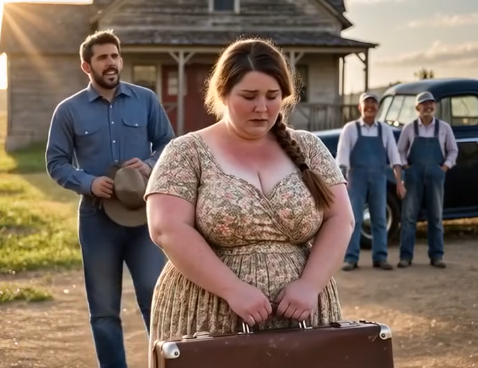
The sun hung low over the dusty road as a creaky Chevrolet rattled toward a lonely stretch of farmland. In the passenger seat sat twenty-four-year-old Margaret, clutching a worn leather suitcase that held everything she owned. Her floral dress was faded, her braids neat but tired. She wasn’t heading toward a new beginning—she was being sent away.
That morning, her father had spoken the words like he was closing a business deal, not sending off his daughter. “Margaret,” he said, not looking at her, “this arrangement will clear our debts and give you a roof over your head. Thomas Brennan is a decent man. You’ll be taken care of.”
Her mother’s tone was even colder. “He’s just a farmer, but at least he offered to pay what we owe in exchange for marrying you. You should be grateful.”
Grateful. The word stung.
When they reached the farmhouse, her father barely slowed down. He unloaded her suitcase, muttered something about “responsibility,” and was gone before the dust even settled. Margaret stood frozen, her heart pounding.
Two figures approached from the barn—a broad-shouldered man in work clothes and an older gentleman with silver hair and kind eyes.
“Miss Margaret?” the younger man said. “I’m Thomas Brennan, and this is my father, Samuel. Welcome to our home.”
She hesitated, expecting the roughness she’d been warned about, but his voice was steady, gentle.
“I know this isn’t how you imagined your life turning out,” Thomas said, meeting her eyes. “But you’ll be treated with respect here. This is your home now—if you choose to stay.”
Samuel gave her a warm nod. “You’ve got nothing to fear here, dear. My son’s a good man.”
And just like that, her life changed course.
Inside, the farmhouse was nothing like she’d expected. It wasn’t lavish, but it was clean, full of light and warmth. The kitchen smelled of baked bread and herbs.
Thomas carried her suitcase upstairs. “Your room’s the first on the right,” he said. “You’ll have privacy. Every door has a lock. You’ll be safe here.”
That night, she joined the Brennans for dinner. The conversation was easy, the food simple but delicious. When she mentioned she loved to read, Thomas smiled. “There’s a shelf of books in the parlor. You can borrow any you like.”
For the first time in years, she felt seen.
Over the following weeks, Margaret learned the rhythms of farm life—the early mornings, the endless chores, the satisfaction of work done well. But what struck her most was how kind Thomas was. He never treated her like property or a burden. He asked her opinion, valued her thoughts, and gave her space to breathe.
Then one day, while helping Samuel organize some old ledgers, she stumbled on something shocking: records showing contracts, profits, and land deeds. The Brennans didn’t just own a small farm—they owned thousands of acres and traded livestock across multiple states.
That evening, she confronted Thomas. “Why didn’t you tell my father about this?” she asked, bewildered.
Thomas sighed. “Because your father didn’t care about your future—just his own debts. If he’d known I was wealthy, he’d have asked for more money. I didn’t want to buy a wife. I wanted a chance at companionship. Someone who might eventually… care.”
His honesty caught her off guard. For the first time, she saw him not as the man who’d rescued her from her father’s cruelty, but as someone quietly fighting his own loneliness.
As months passed, affection grew between them—genuine, steady, unspoken at first but unmistakable. Margaret found herself running the farm accounts, writing letters to suppliers, and organizing events. Samuel treated her like his own daughter. And when Thomas looked at her, it wasn’t pity she saw—it was respect.
One snowy evening, as the fire crackled, Thomas turned to her. “When I agreed to this arrangement, I thought it would be a business matter,” he admitted. “But every day, I’ve come to care for you more. I want you by my side, not because of duty, but because I love you.”
Margaret’s eyes filled with tears. “I thought I was being traded like a possession,” she whispered. “But you gave me a home… and a heart that sees me for who I am. I love you too, Thomas.”
They married again that spring—not as part of a bargain, but as equals. This time, there were flowers, laughter, and joy. Samuel cried openly during the ceremony, calling her the daughter he’d always wanted.
When word of their happiness spread, Margaret’s family showed up uninvited, pretending concern but really seeking access to the Brennan fortune. Her father spoke as though nothing had happened, hinting that perhaps they could “rebuild ties.”
Margaret met his gaze and said calmly, “You sold your daughter like a debt, and I forgave you for that. But you don’t get to come back because my husband is wealthy. I have a family now—one built on love, not desperation.”
Her father’s pride collapsed under her words. He left without another word, and Margaret felt free for the first time in her life.
Years later, she stood on the porch, watching her children chase one another through the golden fields. The same fields where she’d once stood, terrified and unwanted. Now they were home.
She smiled, remembering that frightened young woman with a suitcase full of fear and no hope left to give. The woman who had been “sent away” as a payment had found something her family never understood—love that didn’t demand, wealth that didn’t corrupt, and dignity that couldn’t be sold.
Thomas wrapped an arm around her shoulders. “What are you thinking about?” he asked.
“Just remembering how it all began,” she said softly.
He smiled. “I’m glad it did.”
And as the sun dipped below the horizon, Margaret realized that destiny doesn’t come from where you start—it’s built by the hands of those who finally treat you as if you matter.


